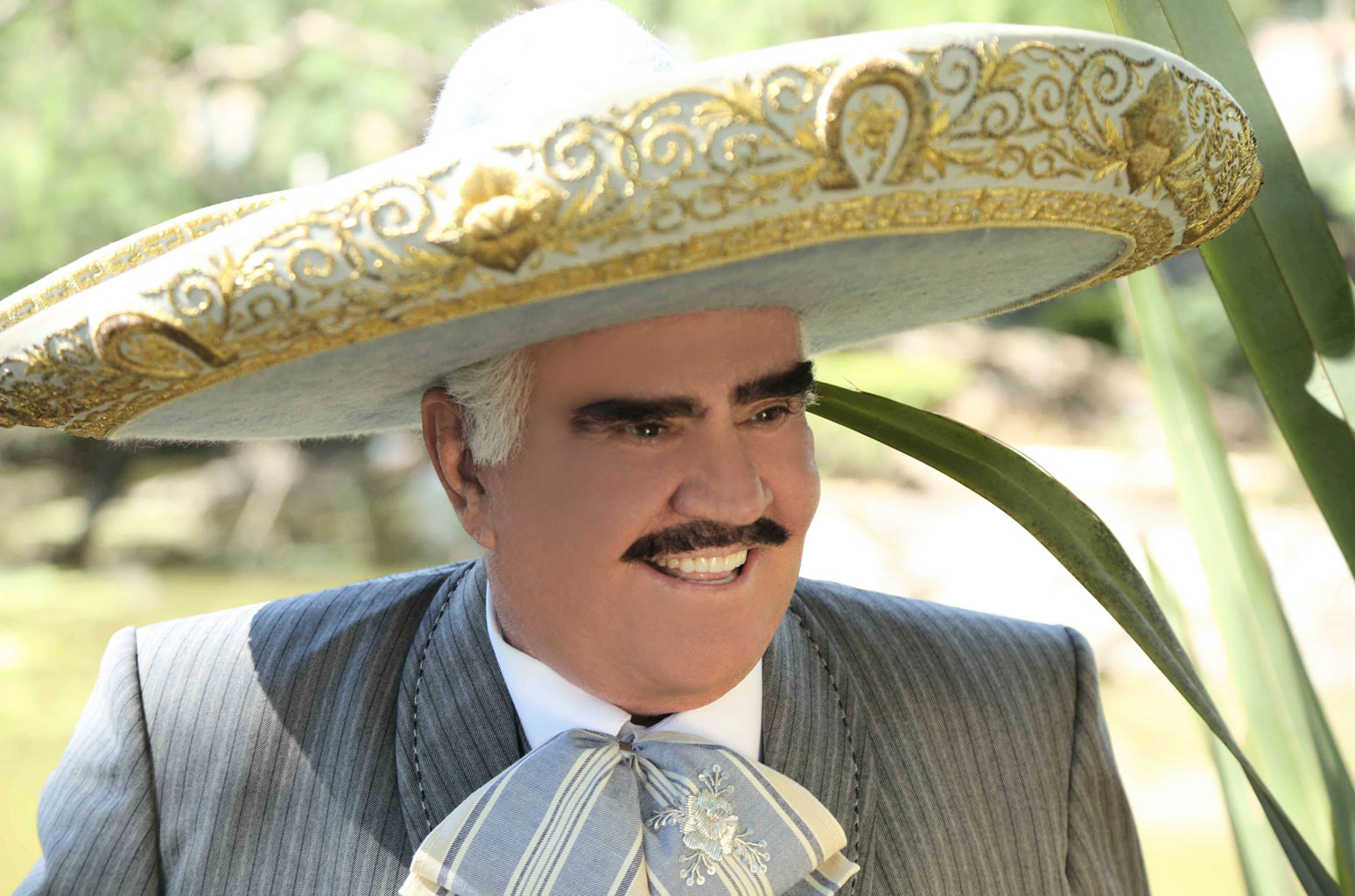Vicente Fernández, the towering icon of Mexican ranchera music whose powerful voice defined the lives of generations of fans throughout Latin America, died in a hospital in Guadalajara on Sunday. In honor of the late ranchero king, here is Billboard‘s interview with him from 2012, which also took place at his beloved ranch, Los Tres Potrillos, where Billboard vice president/Latin industry lead Leila Cobo spent the day with him visiting his animals (including his fabled miniature horses), chatting and having lunch with him and wife Cuquita.
In a hot, serene and rather dusty corner in the outskirts of Guadalajara, Vicente Fernández has carved out his slice of heaven in the shape of a sprawling ranch.
Los Tres Potrillos (The Three Colts), so named after Fernández’s three sons, is—at 20,000 –quite huge, but bordered as it is by an irrigation channel, it has the feel of a cocoon. It surprises me because it’s a working ranch, but it’s also Fernández’s home, and one which he built slowly and carefully, literally from the ground up.
He’ll tell me he always dreamt of having a ranch, and that as a boy, he collected ranch-related figurines, and still does. He’ll tell me he first purchased 150 acres 22 years ago, and that he later added another 450, and another 600 and so on. He also built a house, prettier than J.R.’s in Dallas, for Cuca, his longtime wife. There’s cattle, and horses and stables; even a restaurant and a store. But Fernández’s biggest pride and joy are his miniature horses, which he breeds and raises with such ferocious protectiveness that he’s built a glass-paned room adjacent to one of the stables, so he can see when the foals are born, regardless of the time of day or night.
I meet him by one of his stables, and, dressed as he is in jeans, boots and an open shirt, it strikes me that he is, indeed, a rancher—un ranchero—a fact punctuated during our conversation as he deals with the daily happenings of the ranch, even pausing to give medicine to a colicky horse.
During our chat, he will also pause, frequently, to sing. His music is about his life, and the two are inexorably intertwined.
And, as luck would have it, Fernández is also a storyteller, witty and detail-oriented. Here are some of his tales.

Nowadays everybody seems to be seeking an “international” career and they try their luck at singing in English. But you, on the other hand, have made a career out of being as Mexican as possible and always singing ranchera. Why is that?
Mi’ja, I’ve always said it. A singer can sing anything. But me, my life is Mexican music. For me, putting on my charro outfit is a matter of pride and it’s a very big responsibility.
And you put on your charro outfit in every single concert?
Yes. And for me, the charro outfit goes hand in hand with the personality Vicente Fernández has given it. Without the charro outfit, I don’t feel I’m me.
Have you ever had an urge to record ballads?
No. God forbid! Everybody who comes sing with me has to sing ranchero. Roberto Carlos had to sing ranchero, Vicki Carr had to record ranchero. Celia Cruz came in with a mariachi. I accept recording with everybody, as long as it’s with a mariachi.
What do you look for in your mariachis…a particular sound?
That they really want to work. Because I go onstage and I say, ‘Hijos, I’m going out and I’ll sing until the people get tired.” They know with me we’re talking about singing up to three hours and a half.
In fact, singing on and on defines a Vicente Fernández concert…
[Laughing] I’ve paid fines in the U.S. because I’ve sung one minute over [the ending time]. And, well, if I’m already a minute over, I keep singing. I tell the audience, ‘You know what? They already fined me. So, lets go on here, because I already paid the 15, 20 or 30 thousand dollar fine.’ People go crazy. Because I want to make something clear, mi’ja. The fact that I sing for hours has no merit. Anyone can sing, or almost anyone can sing, what I sing. The trick is to have the audience stays with you for three and a half hours.
And the audience stays if you’re connecting with them, wouldn’t you say?
Raphael [the Spanish singer] once said. [Fernández adopts a Spanish accent] He said: ‘There’s no good audiences. There’s only bad artists.’ The artist that goes out, and he sees people are cold, but he doesn’t have the talent, the heart and the courage [to turn things around], who doesn’t have music running through his veins, well, he has nothing to do in this career. It’s like a bullfighter. If he gets a bad bull and doesn’t do anything for the fight, well. If the audience is cold, it’s the artist’s responsibility to warm them up. Regardless of the pain or sorrow you may have with you.
There have been several times in your career, where you have had great sorrow and pain and have taken the stage. Can you tell us about some of those times?
For example, the first time I worked at Teatro Blanquita in Mexico City, which is a very popular theater, right before I went onstage, they told me my father had died. And I was left cold, because he was fine. They found cirrhosis in his liver, they operated him and I saw him in the morning. He gave me his blessing, and I went to Teatro Blanquita. Right before I began, they told me he died. They offered to tell the audience, but I went out singing.

What song?
A very cheerful song called “Los Laureles” (The Laurels). I went out and tears just poured down my face as I sang that happy song. People couldn’t understand. I sang my four songs, and the audience asked for more and more, to the degree that the next artist couldn’t take the stage. Until the MC had to go onstage and said: “Gentlemen, Vicente isn’t singing any more because there’s a program to follow. Also, Vicente sang because he wanted to, because his father just passed away.” And when people heard that, they stood up and started to clap and clap and clap, for a full four minutes.
You’ve sung through many hard times. Like when your eldest son, Vicente, was kidnapped…
For four months I didn’t know if he was alive. They cut two of his fingers off. I didn’t speak during those four months. But I’d go to the shows and I would sing and dance. I never stopped performing. But when I’d finish, I would go to my room and cry like a child. It was an open secret, because I never said anything, but everyone knew. So people were doubly grateful [to see me perform]. They never saw me shed a tear or complain. They finally knew when I got my boy back and I presented him in public and openly thanked everyone. Because they all knew and I always knew that, and I knew I had their support and their prayers to help my son return to his mother, his children, his wife and myself.
When Vicente was kidnapped, was he allowed to listen to the radio? Listen to you?
Yes. The people who were guarding him initially didn’t know he was my son. And at the time, they were airing a very popular soap, “La Mentira” (The Lie), for I which I recorded the musical theme. [And when they found out who Vicente was], they said, ‘We’re fans of your father and Alejandro. Do you mind if we put on the soap to see your dad sing? Do you mind if we put on an album?’ And Vicente would say no, he didn’t mind.
[Fernández pauses.] I would always say, if I don’t see my son again, I hope God doesn’t turn me into a killer, because your children are everything.
Was your father supportive of your career?
Yes. The only thing is, he was never able to enjoy it. My father, his biggest dream was cattle. And my mother died with the dream of having her own house. And now, if my father lived, he would have a stable with 2,000 cows. I turn around and see my house and say, if my mother lived, I would have built her a palace. But mi’ja, just like my parents went, so will I. I abide to God’s will and I feel that from up above, God and my parents have guided my career.
There’s an anecdote about my father, that I’ve never told anyone, eh? My father didn’t drink, except when he had problems with the cattle and debts, and then he would drink and drink and drink […] Well, my father and I were friends when he wanted to be my friend, and he was my father when he ordered me around. One time, when I was already a singer, they came and told me, “Hey Chente, your dad is drunk.” He had just become a widower. I looked for him in all these cantinas until I found him. I took him to the nightclub where I sang, a place called El Nopal, and I said, “Dad, sit here while I finish my first set.” He was like a little boy: “Yes, son. Yes son. With one condition. Sing for me ‘Gabino Barrera’ [a famous corrido].”
So, I forgot my father had requested a song, and three songs into the set, my dad gets onstage and says, “I told you to sing Gabino Barrera son of a — , and he slaps me so hard I fell on my knees. People didn’t know he was my father, so some guy gets up and punches him on the jaw and sends him under a table. Uy, he shouldn’t have done it. I grabbed a bottle of wine and I shattered it on his head — these were seedy nightclubs, where I started my career. So, I picked up the guy, who was also drunk, and I picked up my father, and I said, “Ladies and gentlemen, forgive me, and my apologies to the man I hit. But this man can hit me as many times as he wants, and he can make me kneel as many times as he wants because he’s my father. And the guy I hit gets up and says, “Forgive me, Chente, forgive me. Break another bottle on my head.” And my dad shouts, “Yes son! Break another bottle on his head!”
Did you always want to sing ranchera music?
Ever since I can remember. When I was six or seven, I would go see Pedro Infante’s movies and I would tell my mother: “When I grow up, I’ll be like them.”
Your career has had no ups or downs, it seems; it’s simply gone up and stayed there.
That’s what El Rey said [referring to the song of that name]. The deal is not getting there, but knowing how to get there and keeping yourself there
And how do you do that?
Respecting your lifestyle. Respecting your career, and living to sing. Not singing to live.
Was there a moment you feel defined you as a performer?
One year in El Salvador, a transformer blew up outside the place where I was performing and the power went out. It shook up the place, eh? I was scared, but I got a lamp, and held it up as if it were a microphone. And I kept on singing, because I have a big voice and it’s ok as long as the mariachi doesn’t play too loud. It never occurred to me to stop the concert. We’d been playing only 15 minutes. So, the mariachi kept playing, and the people who started to leave turned around and came back. The power never came back, and the audience never knew what had happened. They were just thankful [the show continued].
There’s many things that make you love your fans to such a degree, that you don’t care about the money. You live for the audience. You don’t live FROM the audience. For the past five years, my affairs are handled by my accountant and my children. I don’t know what I make and I never deal with money. Nothing. I sing. I tell them, take me place, promote me well and my job is to make people happy.
Tell me about your recording process. Where do you find the material you record?
From everywhere. If it’s a previously unreleased song, I take it to Pedro [Pedro Ramirez, his longtime arranger and producer] and I say I want this and this and this. He gets all my ideas, and when I record, I simply sing over the track. On the few occasions where I don’t like the arrangement, he redoes it, but he places it over my voice. I have many hits, big hits, that have been written by people I don’t know. In almost all my shows, people say, “Chente, here’s a CD.” When I get home, I listen to them all, and what I like, I record.
You also like to record many tracks in one haul, don’t you?
I’ve recorded 25 to 30 songs in a single night, singing five or six takes of each song. I’m very disciplined. If Pedro asks for 20 takes, I’ll give him 20 takes, because it’s his responsibility to structure it properly.
Now, you have a lot of recorded material that’s never seen the light of day, haven’t you?
I have some 60 albums in the market and I have about 300 songs that haven’t been put out yet. The thing is, my vice is singing, hija. I’ll release them little by little And the day I die or retire, my audience will always have music and of very good quality. I’ll never give my audience something that will make them say, “Uf, Chente couldn’t sing anymore.” Time is inexorable. And if in 15 years I still sound the same, well, I’ll continue recording.
You say that in order for someone to sing with you, they have to sing ranchero. What does it take to truly sing good ranchero?
You need to be a ranchero. Because if you sing ranchero, but you don’t know how to heal a horse or milk a cow, how can you relate when you sing: [Fernández starts to sing] “Se mira relampaguear, el cielo esta encapotado, vaqueros para el corral, arrimar todo el Ganado (There’s lightning above, the sky is shrouded, cowboys to the corral, bring in all the cattle)?” You can’t feel it, no matter how much you like all that’s ranchero. Why? Because you don’t live it. You’ve never herded cattle or ridden a horse.
What about when you sing songs like “Volver Volver”?
Ah, because when I sing songs like “Volver Volver” or “Mujeres Divinas” (Divine Women) it’s other experiences. I’m talking about women. And, I’d like to say, through this magazine, through Billboard — the most prestigious magazine in the world –that if Vicente Fernández records a lot for women, he does so because he thinks women are the most beautiful beings God has placed on this planet.
So, this notion that ranchero music “cuts your veins” music isn’t really the case; it’s ranch music…
Yes. Although, I recognize that ranchera songs tend towards machismo, because it’s our custom. A corrido I love is “Juan Charrasquedo,” by Victor Corredor, and it’s a very machista corrido. If you listen, “Sublime Mujer” (Sublime Woman), is talking about a big macho. It says, “I haven’t been able to spend seven nights in the same bed!” But it also has such beautiful phrases. Many people think just anyone can sing a beautiful song about women. But for a singer to really interpret a song like that, he needs experience. If I’m a priest, I can’t sing about beautiful women. But someone like me, with my years
There’s a song by José Alfredo Jiménez I’m going to record that says: [Sings] “Kiss me in front of others. Kiss me in front of your mother. Of the two of us, you’ll be the bravest. And I’ll be the coward. Because at your age, I could be your father […]”
It’s experiences, mi’ja. You can’t sing a song like that if you haven’t been in love with a young woman. I get up to sing, mi’ja, and 20-year-olds get onstage to kiss me. And it’s not a fatherly kiss.
Are you always this frank?
Always. And onstage as well.





